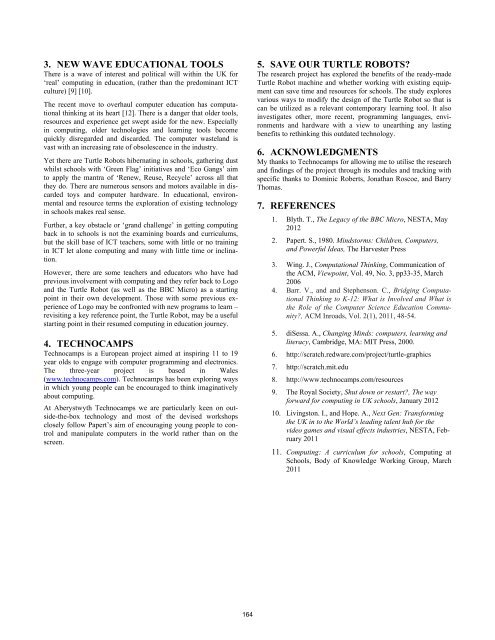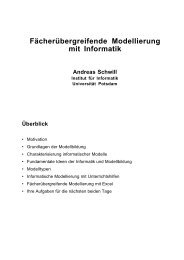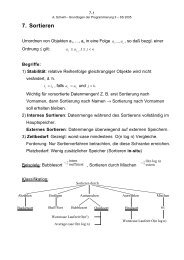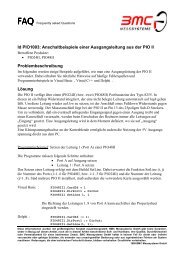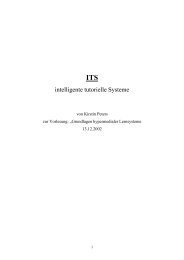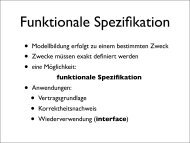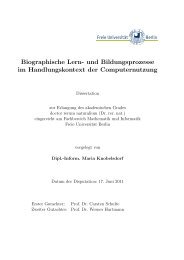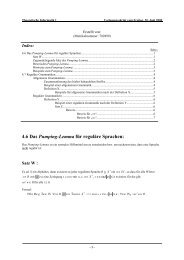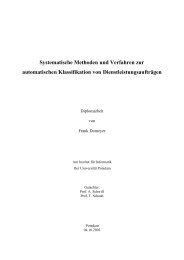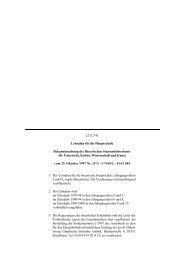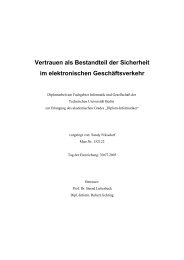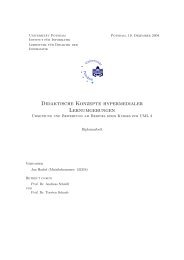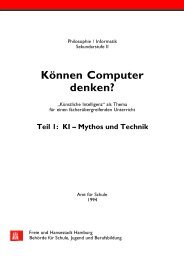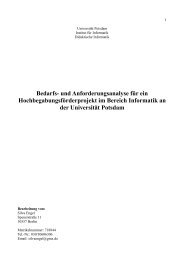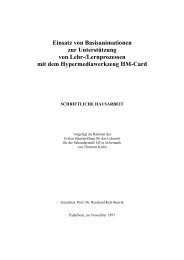Maria Knobelsdorf, University of Dortmund, Germany - Didaktik der ...
Maria Knobelsdorf, University of Dortmund, Germany - Didaktik der ...
Maria Knobelsdorf, University of Dortmund, Germany - Didaktik der ...
You also want an ePaper? Increase the reach of your titles
YUMPU automatically turns print PDFs into web optimized ePapers that Google loves.
3. NEW WAVE EDUCATIONAL TOOLS<br />
There is a wave <strong>of</strong> interest and political will within the UK for<br />
‘real’ computing in education, (rather than the predominant ICT<br />
culture) [9] [10].<br />
The recent move to overhaul computer education has computational<br />
thinking at its heart [12]. There is a danger that ol<strong>der</strong> tools,<br />
resources and experience get swept aside for the new. Especially<br />
in computing, ol<strong>der</strong> technologies and learning tools become<br />
quickly disregarded and discarded. The computer wasteland is<br />
vast with an increasing rate <strong>of</strong> obsolescence in the industry.<br />
Yet there are Turtle Robots hibernating in schools, gathering dust<br />
whilst schools with ‘Green Flag’ initiatives and ‘Eco Gangs’ aim<br />
to apply the mantra <strong>of</strong> ‘Renew, Reuse, Recycle’ across all that<br />
they do. There are numerous sensors and motors available in discarded<br />
toys and computer hardware. In educational, environmental<br />
and resource terms the exploration <strong>of</strong> existing technology<br />
in schools makes real sense.<br />
Further, a key obstacle or ‘grand challenge’ in getting computing<br />
back in to schools is not the examining boards and curriculums,<br />
but the skill base <strong>of</strong> ICT teachers, some with little or no training<br />
in ICT let alone computing and many with little time or inclination.<br />
However, there are some teachers and educators who have had<br />
previous involvement with computing and they refer back to Logo<br />
and the Turtle Robot (as well as the BBC Micro) as a starting<br />
point in their own development. Those with some previous experience<br />
<strong>of</strong> Logo may be confronted with new programs to learn –<br />
revisiting a key reference point, the Turtle Robot, may be a useful<br />
starting point in their resumed computing in education journey.<br />
4. TECHNOCAMPS<br />
Technocamps is a European project aimed at inspiring 11 to 19<br />
year olds to engage with computer programming and electronics.<br />
The three-year project is based in Wales<br />
(www.technocamps.com). Technocamps has been exploring ways<br />
in which young people can be encouraged to think imaginatively<br />
about computing.<br />
At Aberystwyth Technocamps we are particularly keen on outside-the-box<br />
technology and most <strong>of</strong> the devised workshops<br />
closely follow Papert’s aim <strong>of</strong> encouraging young people to control<br />
and manipulate computers in the world rather than on the<br />
screen.<br />
164<br />
5. SAVE OUR TURTLE ROBOTS?<br />
The research project has explored the benefits <strong>of</strong> the ready-made<br />
Turtle Robot machine and whether working with existing equipment<br />
can save time and resources for schools. The study explores<br />
various ways to modify the design <strong>of</strong> the Turtle Robot so that is<br />
can be utilized as a relevant contemporary learning tool. It also<br />
investigates other, more recent, programming languages, environments<br />
and hardware with a view to unearthing any lasting<br />
benefits to rethinking this outdated technology.<br />
6. ACKNOWLEDGMENTS<br />
My thanks to Technocamps for allowing me to utilise the research<br />
and findings <strong>of</strong> the project through its modules and tracking with<br />
specific thanks to Dominic Roberts, Jonathan Roscoe, and Barry<br />
Thomas.<br />
7. REFERENCES<br />
1. Blyth. T., The Legacy <strong>of</strong> the BBC Micro, NESTA, May<br />
2012<br />
2. Papert. S., 1980. Mindstorms: Children, Computers,<br />
and Powerful Ideas, The Harvester Press<br />
3. Wing. J., Computational Thinking, Communication <strong>of</strong><br />
the ACM, Viewpoint, Vol. 49, No. 3, pp33-35, March<br />
2006<br />
4. Barr. V., and and Stephenson. C., Bridging Computational<br />
Thinking to K-12: What is Involved and What is<br />
the Role <strong>of</strong> the Computer Science Education Community?,<br />
ACM Inroads, Vol. 2(1), 2011, 48-54.<br />
5. diSessa. A., Changing Minds: computers, learning and<br />
literacy, Cambridge, MA: MIT Press, 2000.<br />
6. http://scratch.redware.com/project/turtle-graphics<br />
7. http://scratch.mit.edu<br />
8. http://www.technocamps.com/resources<br />
9. The Royal Society, Shut down or restart?, The way<br />
forward for computing in UK schools, January 2012<br />
10. Livingston. I., and Hope. A., Next Gen: Transforming<br />
the UK in to the World’s leading talent hub for the<br />
video games and visual effects industries, NESTA, February<br />
2011<br />
11. Computing: A curriculum for schools, Computing at<br />
Schools, Body <strong>of</strong> Knowledge Working Group, March<br />
2011


